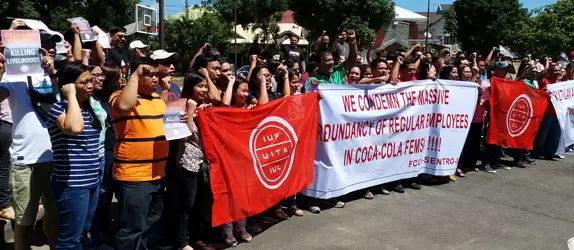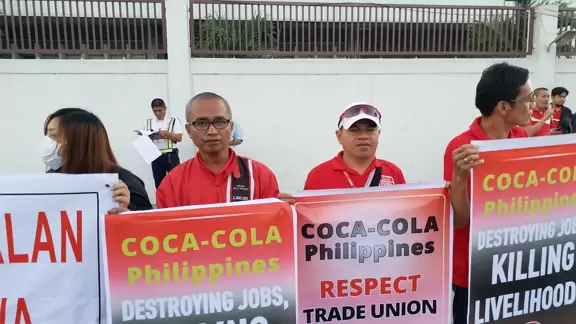Coca-Cola bottler FEMSA’s business model for the Philippines – job destruction, labour law violations and systematic rights abuses

In the two years prior to the introduction of the sugar tax, the Federation and Cooperation of Cola Beverage and Allied Industry Unions (FCCU), affiliated to IUF through the SENTRO Food & Beverage Council, engaged the government and the company in extensive discussions on industry reform, jobs and public health, with a view to finding a sustainable way forward. Despite this, Coca-Cola FEMSA simply ignored the real issues around the sugar tax, bypassed negotiations with unions and announced the forced mass redundancy of 606 sales force workers on January 30, 2018.
The sudden, mass termination of workers not only violates workers’ trade union rights, it paves the way for increased rights violations in the Coca-Cola system. Prior to the mass layoffs, the company had already engaged third party “delivery partners” to replace the direct, permanent employees of Coca-Cola FEMSA in several sales territories. Investigation by IUF and FCCU into these delivery partners revealed the systematic underpayment of sales force workers below the legal minimum wage in their respective regions (legal daily minimum wage rates are set by region). Sales workers and helpers/drivers employed by these “partners” are paid between 5% to 34%, less than the legal minimum wage. In one region, four delivery partners regularly cut wages by half if workers fail to meet their sales targets, pushing wages even further below the legal minimum.
Under Philippines law, as an indirect employer Coca-Cola FEMSA Philippines is responsible for these minimum wage violations, and are considered direct employers in terms of legal liability. The OECD Guidelines on Multinational Enterprises also hold The Coca-Cola Company and Coca-Cola FEMSA responsible for rights violations in their business operations and supply chain. Despite this, the company has intensified mass lay-offs and increased business for third party companies that will deliver lower costs through violating rights and breaking minimum wage laws.
The new business model presented as the company’s response to the sugar tax is built on illegal activity, poverty wages, insecure jobs and human rights violations.
The aggressive attack on rights that underpins the new business model is further demonstrated by the refusal of The Coca-Cola Company and Coca-Cola FEMSA to recognize that union members rejected the forced redundancies by writing “under protest” when forced to sign. Management claimed all workers “agreed”, and threatened to withhold employment certificates if they continued to protest.
Having destroyed jobs and undermined its own sales capacity before the peak season for the business, the company is now moving to forcibly lay-off hundreds of workers in manufacturing while continuing to reject genuine negotiations with unions.

